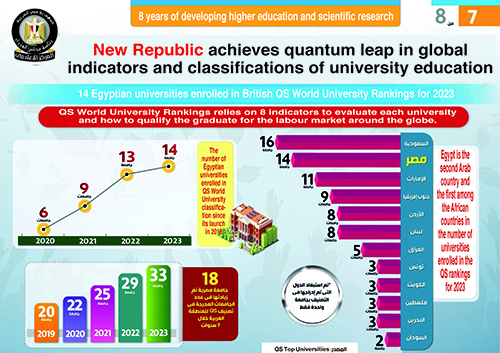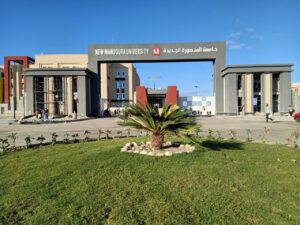Egypt has made great strides towards implementing its national vision to develop the higher education sector and improve the quality of its output.
The government has managed to establish a strong and modern educational infrastructure and introduce new and diverse specializations that keep pace with the requirements of the local and the international labour market.
The higher education sector has also succeeded in concluding partnerships and agreements with major foreign universities, which established branches in Egypt, in addition to expanding the construction of technological and private universities.
These steps contribute to the development of the university education system and qualify it for global competition.
In this regard, the cabinet’s Media Centre published a report recently, in which it highlighted efforts made by the government to advance higher education and scientific research over the past eight years.
The report sheds light on the quantum leap the New Republic is making in international indicators and university education classifications.

Global rankings
In a recent report, American credit rating agency, Fitch Ratings, refers the hard work Egypt made to improve the ranking its universities at the regional level.
Egyptian universities, it said, move from strength to strength in top international ranking systems, with Egypt giving a strong overall performance, compared to its regional peers.
Aswan University topped the 2022 list of Egyptian universities. It is followed by the University of Kafr el-Sheikh and the University of Mansoura.
In 2021, the top Egyptian universities were Aswan, Mansoura, and Suez Canal.
The Ministry of Higher Education and Scientific Research witnessed many distinguished achievements in various sectors during 2022.
This came in the light of directives by President Abdel Fattah El Sisi for developing modernizing higher education, raising its efficiency and keeping up with global developments in the higher education field.

Digital transformation
Digitising all the state’s sectors has become an imperative for facilitating procedures, and keeping up with global technological developments.
The government has developed the infrastructure and information system in public universities, universities of technology, technical institutes, research centres, university hospitals, and e-learning systems, investing over EGP 11 billion (roughly $365.5 million) in this regard.
The Ministry of Higher Education seeks to raise the efficiency of the information infrastructure in universities and launch electronic tests.
It also wants to raise the efficiency of the information infrastructure in university hospitals and establish more electronic educational platforms that rely on distance learning, things that proved their effectiveness at the height of the Covid-19 pandemic.
Progress made by Egypt in all the aforementioned fields encouraged UNICEF to commend the Arab country for establishing a digital infrastructure to support the education system.
“Long-term investments in digital learning have contributed to mitigating the impact of Covid-19, by switching to distance learning,” the organization said.
The information system inside and the infrastructure of 15 private universities and nine technological universities were developed at a cost of EGP 4.5 billion (about $145 million).
This adds to the development of the information infrastructure inside ten government-run technical institutes with EGP 34 million (around $88,300) in estimated investments (in the first phase).
The second phase of the same project is being implemented with investments of EGP 65 million (roughly $2.1 million). The second phase of the project is being implemented in 35 technical institutes.
The ministry has signed a series of agreements with pioneering international technology companies, such as Huawei.
This agreement aims to develop 75 academies and ten laboratories in Egyptian universities.
The ministry also signed an agreement with worldwide IT leader, Cisco, to establish ten laboratories in local universities.
The Oxford Business Group expected the branches of international universities in Egypt to attract a larger number of students and turn Egypt into a leader in higher education in the Middle East and North Africa region.
Egypt has a large and competitive university population. In 2021, there were 27 public universities, up from 23 in 2014, with 3 million students, 430,000 of whom were at the postgraduate level.
Higher education received EGP 122 billion ($7.8 billion) in government spending in FY 2020/21, with a large quantity going to completing the construction of three public universities; building two new universities; establishing 12 non-profit private universities; and operating nine digital universities.
Egyptian universities were globally recognised, with three among the top-1000 international institutions in the QS World University Rankings 2021.
The number of peer-reviewed publications has also increased, with 32,323 in 2020, up from 26,223 in 2019.
As international recognition of Egypt’s tertiary education has grown, so has the number of foreign students it attracts.
The number of international students enrolled in public and private universities rose from 22,000 in 2014 to 87,000 in 2022.
Meanwhile, more than 1,200 Egyptian students studied abroad in 2022.
Since the administration of President Sisi came to power in 2014, it has increased government spending on the educational sector and developed plans for the construction of new schools and universities to meet demand by Egypt’s growing population.
Egypt is the African country most represented in the Times Higher Education World University Rankings.
It works around the clock on serious planning for major reforms in the higher education system.

Co-operation with African countries
The Ministry of Higher Education was keen to enhance co-operation with various African countries, in its belief that higher education and scientific research can function as main drivers of social and economic development in Africa.
The total number of Egyptian scholarships allocated to the African countries last year reached 2,317 (1513 scholarships at the undergraduate level, 733 for postgraduate studies and 71 for studying the Arabic language).
The ministry seeks to link Egyptian universities with their African counterparts, through partnerships and twinning programmes.
The Helwan University has already hammered out a partnership agreement with the University of Limpopo in South Africa.
Egyptian research centres communicate with African researchers to conduct joint research projects, especially in the fields of agriculture, food, mineral resources, new and renewable energy, health, and space technology.
Egypt also moved up 14 places in the Education Quality Index issued by US NEWS, the cabinet’s Media Centre said in its report.

It added that this put Egypt in the 37th place in 2022, compared to the 51st place in 2019.
The centre noted that the index ranks the best educational systems around the world.
In the same context, the report showed that Egypt advanced ten places in the Global Innovation Index, as it ranked 89th in 2022, compared to 99th in 2014.
The index depends on several sub-pillars, including research and development, spending on research, and exporting high-tech industries.
The report revealed the inclusion of 49 Egyptian universities in the Spanish Scimago classification for 2023.
This classification is concerned with ranking universities and research centres according to a composite index, which combines three different indicators, based on research performance (50%), innovation outcomes (30%), and societal impact (20%).
Each major indicator includes a number of sub-indicators, in case the institution publishes at least 100 research papers in the Scopus database during the evaluation year.






Discussion about this post